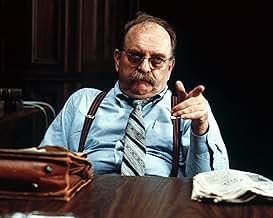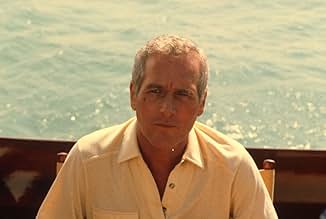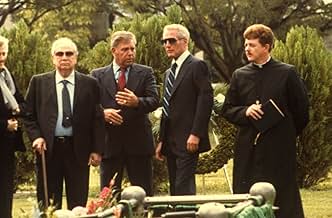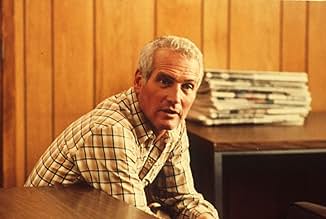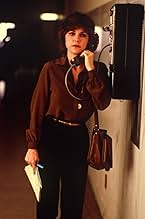Lorsqu'un procureur divulgue de fausses informations selon lesquelles un propriétaire d'entrepôt d'alcool est impliqué dans le meurtre d'un dirigeant syndical, la vie de cet homme commence à... Tout lireLorsqu'un procureur divulgue de fausses informations selon lesquelles un propriétaire d'entrepôt d'alcool est impliqué dans le meurtre d'un dirigeant syndical, la vie de cet homme commence à se dégrader.Lorsqu'un procureur divulgue de fausses informations selon lesquelles un propriétaire d'entrepôt d'alcool est impliqué dans le meurtre d'un dirigeant syndical, la vie de cet homme commence à se dégrader.
- Réalisation
- Scénario
- Casting principal
- Nommé pour 3 Oscars
- 3 victoires et 8 nominations au total
- Nickie
- (as Anna Marie Napoles)
- Walker - Standard's Photographer
- (as Rooney Kerwin)
Avis à la une
The movie asks us, though, to keep in mind that sometimes there's more going on than meets the eye, and that certain acts function as a means to an end. It can be seen as an extension of that great 70's movie tradition where acclaimed directors make polished films exposing high-level corruption. "Absence of Malice" is an involving exercise in paranoid mystery, with Newman in fine form as always, and Sally Field providing capable support.
Sally Field is an ethically-challenged reporter. With the help of an even more unscrupulous federal investigator, played by Bob Balaban, she writes a story that implicates Michael Gallagher (Paul Newman) in the disappearance & presumed murder of a union boss. Gallagher is on the radar because his uncle is a mobster. The film employs a procedural narrative that delivers little dramatic tension. The severest act happens off screen. The characters feel slightly underwritten. The exception is Melinda Dillon's poignant portrayal of Teresa Perrone, Gallagher's best friend, who occupies the moral epicenter.
While everyone else is playing a game of extreme cynicism, not uncommon in journalism and politics, Teresa feels most acutely. I liked the straight-forward approach and lack of style. Of course, director Sydney Pollack was never known as a stylist. I'm not saying this in the pejorative. I enjoy Pollack's work. Wilford Brimley makes a needed, late appearance to munch down on some scenery.
It does have the distinct feel of a film made to make a go for the Oscars, with Paul Newman making repeated failed runs at the Best Actor prize at this point in his career. Still Newman in the lead gave gave a film at that time the same amount of heft that Tom Hanks in the lead gives a film today.
An absorbing and uniformly well-acted blend of newspaper movie, political thriller, character study and romance (with the latter being the least successful i.e. most disposable and unconvincing element), the film deservedly earned Oscar nominations for Newman (his sixth – playing a longshoreman who starts being investigated about the murder of a rival simply because of his parental link to mobsters and the damage it causes to his integrity and daily existence), Melinda Dillon (as a friend of Newman’s who’s brought in to supply an alibi for him but which would expose the guilt in her own personal matters and which lead her to commit suicide!) and Kurt Luedtke’s fine, incisive script. Sally Field isn’t an actress I’m particularly fond of (for the record, I’ve watched neither of her two Oscar-winning performances in NORMA RAE [1979] and PLACES IN THE HEART [1984]: their directors, Martin Ritt and Robert Benton respectively, would coincidentally prove crucial to Newman himself!), though she’s perfectly cast here in a role encompassing resourcefulness, tenacity, awkwardness, tenderness and, finally, humility. She’s the star reporter who initially ‘leaks’ the news of the investigation on Newman thinking it as her duty, but doesn’t stop to ponder the consequences…as a result of which, her relationship with Newman proves a troubled one (in the film’s most intense sequence, he physically assaults her when she turns up before him after Dillon’s death!).
The title is a reference to a legal clause which basically states that newspapers are free to print anything they like, and that the people involved can do nothing against them because their reporting is accurate (even if it may not ultimately prove to be factual). The film’s climax – which plays like a dry-run for THE VERDICT itself and is highlighted by a scene-stealing turn from Wilford Brimley, it’s revealed how Newman has cleverly rebounded the affair on itself (so that it’s the reporters, the investigating committee and the D.A’s office who get their gooses cooked, as it were!). A nice surprise is Luther Adler’s appearance as Newman’s mobster uncle – and also worth mentioning is Dave Grusin’s fine score.
Le saviez-vous
- AnecdotesPaul Newman once said of this movie while publicizing Le verdict (1982): "I'd rather have the freedom to do the kind of pictures like Le verdict (1982) ... I enjoyed kicking the beejeezus out of the press in Absence de malice (1981)."
- GaffesAfter spending his first night with Megan, Michael tells her as he is leaving that it is 5:30 a.m. It is clearly daylight outside. In Miami in mid-December, it would still be dark outside at that time.
- Citations
James J. Wells: You had a leak? You call what's goin' on around here a leak? Boy, the last time there was a leak like this, Noah built hisself a boat!
- ConnexionsEdited into Absence of Satan (1985)
Meilleurs choix
- How long is Absence of Malice?Alimenté par Alexa
- What is 'Absence of Malice' about?
- Is "Absence of Malice" based on a book?
- What does the title "Absence of Malice" mean?
Détails
Box-office
- Budget
- 12 000 000 $US (estimé)
- Montant brut aux États-Unis et au Canada
- 40 716 963 $US
- Week-end de sortie aux États-Unis et au Canada
- 97 667 $US
- 22 nov. 1981
- Montant brut mondial
- 40 716 963 $US
Contribuer à cette page



